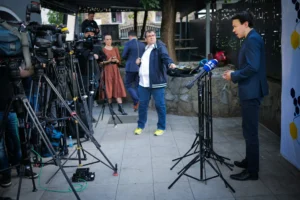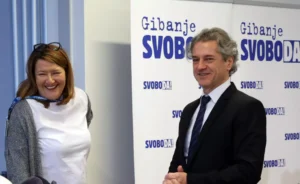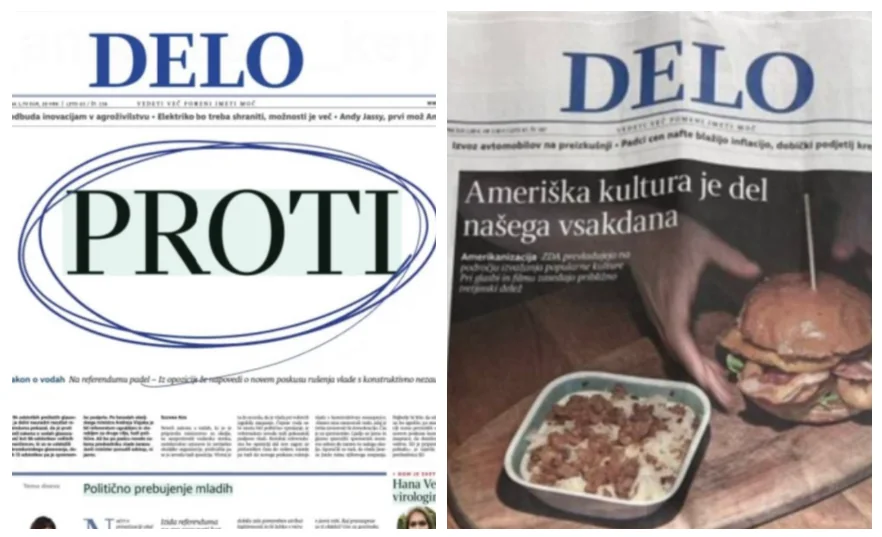The most important thing that happened in the referendum on unfair pension supplements for the privileged elite was the first defeat of the mainstream media. Just like with the water referendum, the media was organised on the left-wing political pole. But they failed anyway. This is a strong indicator that people no longer trust the media. Is it also a sign that the power of the deep state, which has relied mainly on controlling the media and institutions for the last few decades, is waning?
Practically all of the media outlets controlled by the notorious ‘deep state’ were strongly in favour of the law on the pension supplements for outstanding achievements in the arts, which would have awarded the select favoured artists of left-wing politics pensions of up to three thousand euros. It is also worth noting how Prime Minister Robert Golob publicly swore that, at most, four outstanding cultural figures would receive the supplement each year, and no more. Then, the Ministry of Culture revealed to journalists at a press briefing that they still had 27 applications under the old law and that 17 of them were eligible for the supplements under the new one. They would have, therefore, gotten their pension supplements immediately. With the exception of Nova24 and Peter Jančič, not a single mainstream media outlet asked for the names of the 17 lucky recipients, and those of us who did ask, were told that, in order to protect their privacy, they were not allowed to disclose which 17 individuals would automatically receive the privilege immediately.
Agitprop RTV Slovenia
The most obvious media outlet that engaged in this was the “depoliticised” national media outlet, Radio-Television Slovenia (RTVS), which even earned itself a warning from the Culture and Media Inspector for its programme “Politically with Tanja Gobec” (Politično s Tanjo Gobec), which featured two – as the presenter introduced them – “award-winning meritorious cultural workers,” Vinko Möderndorfer and Miran Zupanič, who, together with the presenter, used almost the entire programme to agitate against the referendum and in favour of a law that would allow the coalition Left party (Levica) to grant extraordinary pensions to their ideological colleagues working in culture.
According to the Inspector, his inspection of the controversial programme confirmed the presumption that the content of the show did not comply with the provisions of the Election and Referendum Campaigns Act (ZVRK) and the Radio-Television Slovenia Act (RTVS-1), but also found that in the specific case, there was no legal basis for an inspection or infringement procedure, and therefore no proceedings would be initiated by the Inspectorate against RTV – however, the Inspector publicly urged RTV to comply with the legislation in the future, which was an embarrassment for the public institution.
Meanwhile, RTV Slovenia had been sabotaging the referendum campaign from the very beginning: they even delayed the drafting of the rules on reporting during the referendum, even though they are legally obliged to have them ready by the start of the referendum campaign.
During the campaign, RTV then reported that under the new law on privileged pensions, recipients of the Prešeren Fund awards and state honours with at least one other major award would also be able to receive a half-rate supplement to their pensions, and praised the government for making the list of recipients public, so that inheritance of the supplement would no longer be possible, but an MP from the Slovenian Democratic Party (Slovenska demokratska stranka – SDS) pointed out that a crucial detail has been left out. Which one? Supplements to pensions for artistic achievements have existed in Slovenia since 1974, when the Act on the Exceptional Recognition and Assessment of Old-Age Pensions for Persons with Special Merits was adopted.
The new law, which would replace the old one after 50 years, provided for greater transparency and clearer conditions for the granting of supplements.
“The RTV, however, forgot to mention one essential point. Namely, that these allowances will not be taxed and that the inheritance under the old law also had to be decided on by the Government of the Republic of Slovenia (the last inheritance was agreed upon in 2004 under Anton Rop), while at the same time summarising the Ministry of Culture’s position that the average pension of a retired artist is as much as 1,344 euros, which is a good 400 euros above the pension of an average pensioner. And now we are also going to give them an allowance of 877 euros, on average, for a one-off cultural achievement, which would equal 263,100 euros after 25 years of retirement?” pointed out SDS MP Andrej Hoivik.

Möderndorfer also “concentrated” on 24ur
Vinko Möderndorfer did not regularly appear only on the shows of the public broadcaster RTV Slovenia. He also regularly appeared on 24ur, where they also clearly agitated against the referendum. On POP TV, he was requested by journalist Miha Drozg to appear on the main news programme 24ur to explain how he found it “appalling” that people were deciding on the inflated pensions of artists, in the sense that this was not a matter for ordinary people – it could only be decided by politicians and their bureaucrats.
But on the show 24ur – similarly to the national media outlet – they omitted an important detail. According to the media outlet Online Newspaper (Spletni časopis), Möderndorfer would be entitled to a hefty cash supplement to his pension under the new law. Möderndorfer, who is 66 years old, fulfils all the conditions for receiving the supplement in question. The amount is currently being determined by adding half of the amount up to the maximum pension, which is around three thousand euros net, to the pension earned by the artist, the newspaper reports. If POP TV managed to mention in the case of Smrekar, the artist who breastfed a dog, that she would be one of the beneficiaries of these allowances if the law were to enter into force, they failed to do so in the case of Möderndorfer.
Even after the referendum battle was over, when it was clear that the right-wing opposition had won by a landslide, they tried to portray the referendum as irrelevant, saying that “even after the referendum, the Yugoslav law of 1974 remains in force.” At the same time, they meanly wondered about which of the two won – “the opposition or envy”?
Odlazek’s network of companies shamelessly campaigned for the government – instead of the government
Although the government itself did not officially participate in the campaign in favour of the law and instead called for a boycott of the referendum, the media loyal to it did, led by Odlazek’s media network, the big winners of public money in the media tender prepared by the Ministry of Culture under the leadership of Asta Vrečko, who also proposed the infamous law in question, which was the subject of the referendum.
The main supporters of the new law were, of course, the authors on the Necenzurirano (Uncensored) web portal, and their articles were then leaked to the network media, such as Svet24, Reporter, and some radio stations. Someone hiding behind the pseudonym “Ford Perfect” (some people claim that it is the former Secretary-General of the Prime Minister’s Freedom Movement party – Gibanje Svoboda, Vesna Vuković) wrote or incited that the costs of the referendum should be charged to the petitioners. They did not problematise the hundreds of millions of euros from public infrastructure projects that have been thrown away by the annexes, nor the dilapidated building on Litijska Street 51, or 13 thousand obsolete computers … it is only the six million euros that have enabled the citizens to “measure” their dissatisfaction with the Golob government that bothers them.

On their “sister” website, Svet24, they warned of “the most expensive referendum ever,” and then last week, when the voting was already underway, they made a widespread claim of low support and predicted that the referendum would fail to reach a quorum.
On Radio Aktual, listeners in lobbies and cafés also listened to claims about the right-wing opposition insulting and humiliating artists on a daily basis.
The newspaper Delo has gone down in the annals of Slovenian media history
Delo, which is owned by companies linked to Kučan’s tycoon Stojan Petrič, an otherwise reliable business partner of the current government, also took an active part in the agitprop IN FAVOUR of the law and AGAINST the referendum. Together with other mainstream media, they problematised the fact that the SDS party used (public!) quotes from some (public!) figures on the leaflets for the referendum, saying that they disagreed with the publication of the quotes.
But they will be most remembered by the headline published the day after the referendum. Instead of writing about what had happened, the cover story was all about Slovenia’s obsession with American culture. No sign of the referendum! The incredible hypocrisy was quickly exposed by social media users on X, who pointed out that in the past, Delo published front-page headlines about referendums that ended well for the current government coalition – both the water law referendum and the three referendums in 2022, where the then-fresh Golob coalition also celebrated on the wings of the Covid-19 discontent.
The newspaper, which won 95,000 euros of taxpayers’ money in a media tender and whose owner is expecting a 100-million-euro annex from the state for the works on the second railway line to Koper, this time so biasedly covered up the results of the referendum that even the otherwise apolitical members of the public got angry and started to poke fun at the newspaper, saying they were the regime’s mouthpiece.
A united media front was not enough
A united front of the media and left-wing politics was not enough this time. The plebiscitary defeat in the elections is also a sign that their power is finally beginning to wane, but it is also a manifestation of the enormous dissatisfaction with the policies of Robert Golob and his ministers.
Tomšič: The power of the media is diminishing
We asked political analyst and professor Dr Matevž Tomšič if the media are on the wane, and he confirmed that the power of the traditional media is diminishing globally, but that they should not be written off (yet).

We are publishing his statement in its entirety below:
“This is not the first time that an option opposed by the traditional media has won a referendum. This is true of all referendums in which the right has won. The power of this media is diminishing on a global scale. This was demonstrated by Donald Trump’s victory in the US presidential elections, even though he was opposed by the majority of the print and electronic media. But they still have some influence, so they cannot be written off completely.”
I. K.


